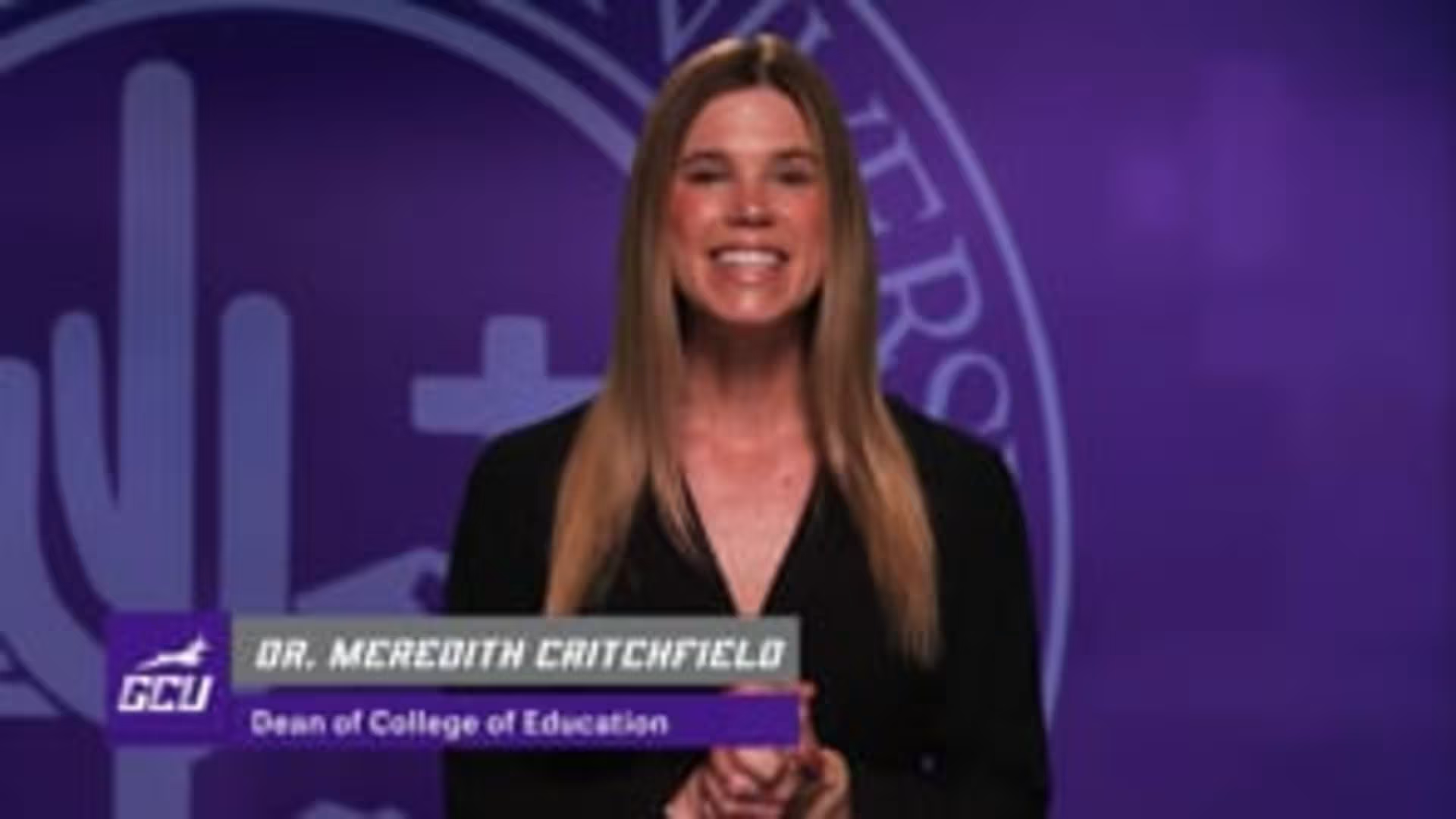
Online Secondary Education Degrees
Prepare To Teach With Confidence and Inspire Future Generations
Grand Canyon University offers numerous online(See disclaimer 1) secondary education degrees designed to equip educators with the skills and knowledge needed to effectively teach students in grades 6-12. These programs deliver comprehensive coursework to cover foundational topics such as curriculum development, assessment and classroom management. Whether you’re interested in math, English, history, STEM or humanities, GCU offers specialized degrees to help you focus on the subject you want to teach.

Licensure vs. Non-Licensure
GCU offers both licensure and non-licensure programs to support a variety of professional pathways. Our licensure programs are aligned with state standards for teaching certification and provide a structured pathway to initial teacher licensure. Pursuing state licensure is essential for working as a certified teacher in public secondary school settings.
Our non-licensure programs are designed for students who already hold a valid teaching license or are interested in pursuing roles in education that do not require state certification. Non-licensure programs offer targeted learning without the licensure component, allowing you to deepen your expertise or shift your career focus.

Explore Secondary Education Degrees Online
GCU’s teaching degrees combine engaging coursework with the flexibility of online(See disclaimer 1) learning to help empower students to earn their teaching credential without putting other responsibilities on hold. These programs combine pedagogy and theory with practical application, helping to prepare graduates to navigate today’s evolving classrooms with confidence.
A bachelor’s degree in secondary education provides a foundation for teaching competencies in instruction, lesson planning and curriculum development. Depending on what subject area you’d like to teach, you can specialize in English, math or history education. These bachelor’s programs all lead to initial teaching licensure.
Choose between licensure and non-licensure master’s degrees in secondary education that focus on developing effective strategies to support learning needs. You can explore topics such as integrating technology, adapting teaching methods for diverse learners and fostering student engagement and academic growth.
A graduate certificate in secondary education offers an alternative path to teacher licensure for individuals with a bachelor’s degree in Arizona only. The program combines learning theory with practical experience, including classroom teaching, to help prepare graduates to become licensed middle and high school teachers.
Our Program Options
10 Matching Degrees
"You should feel inspired by your faculty and classmates to learn how to be the best you can be, and earning a master’s in secondary education from GCU can help you accomplish that and truly make a difference in your classrooms, schools and communities."
"You should feel inspired by your faculty and classmates to learn how to be the best you can be, and earning a master’s in secondary education from GCU can help you accomplish that and truly make a difference in your classrooms, schools and communities."
Coursework in Online Secondary Education Degree Programs
Our secondary education degrees cover topics such as developmental psychology, research-based learning methodologies and literacy intervention. The curriculum focuses on the cognitive and social-emotional growth of students.
The licensure programs guide students through their practice-based and observational experiences. Access to a classroom in an approved school is required to complete the program’s student teaching assignments. Master’s-level courses provide practicum opportunities to get involved in community and professional organizations that promote change in education.
Career Paths for Graduates of Secondary Education Programs
Graduates from online(See disclaimer 1) secondary education degree programs typically teach in middle schools, high schools or private schools. They sometimes take on additional responsibilities such as coaching a sports team, running an academic club or getting involved in after school programs.(See disclaimer 2)
With a degree in secondary education, along with state teaching licensure, you may be able to pursue positions such as:
Middle and high school English teacher
Middle and high school math teacher
Middle and high school history teacher
English as a second language (ESL) teacher
Median annual wage for high school teachers in May 2024(See disclaimer 3)
Job openings expected to open for high school teachers each year, on average, from 2024 to 2034(See disclaimer 4)
Frequently Asked Questions
Learn more about earning secondary education degrees online by exploring these frequently asked questions.
What is a secondary education degree?
Can you get a secondary education degree online?
Are online secondary education degrees worth it?
Flexible and Convenient Online Secondary Education Degrees
At GCU, you can join a community of educators who are passionate about making a positive impact on the lives of high school students. Our programs can help equip you with modern teaching strategies and technology-integrated methods that reflect today’s evolving classroom environments.
Our coursework meets the standards from the Interstate Teacher Assessment and Support Consortium (InTASC) and the International Society of Technology Educators (ISTE). Our secondary education degrees cover ethical decision-making and legal awareness in education to help prepare current and future educators for responsible teaching. Rooted in a Christian worldview, our curriculum can help empower you to find your purpose both in and outside the classroom.
Admission requirements for online(See disclaimer 1) secondary education degrees may vary depending on the program, degree level and modality. Visit our admission page to explore the specific criteria for your program of interest.
GCU has been institutionally accredited by the Higher Learning Commission since 1968, reflecting its longstanding commitment to delivering quality education and instruction. Additionally, select programs carry programmatic accreditation from the Association for Advancing Quality in Educator Preparation (AAQEP).
Pursuing a degree in secondary education online(See disclaimer 1) offers a convenient and flexible format for advancing your education. Our Learning Management System can help you connect and collaborate with your peers and professors, through projects and discussion boards. You also have access to student services counselors and tech support if you need assistance throughout your program.
Student Resources
At GCU, we are committed to supporting you throughout your academic journey. You’ll have access to a wide range of tools and services. Explore our student resources and discover online tuition options that help you focus on what matters most: your education and career.

Ready to make a difference in high school classrooms? Begin your secondary education degree today.
If you are seeking licensure/certification, please refer to the "Accreditation and Compliance/State Disclosures” link for the specific program of interest’s website for your location and/or employment state’s licensure requirements, per 34 CFR 668.14(b)32 and 668.43(c).
Excluding observational and practice-based experiences and student teaching.
- U.S. Bureau of Labor Statistics. (2025, Aug. 28). High School Teachers. Occupational Outlook Handbook. Retrieved September 2025.
- The earnings referenced were reported by the U.S. Bureau of Labor Statistics (BLS), High School Teachers, as of May 2024, retrieved September 2025. Due to COVID-19, data from 2020 to 2023 may be atypical compared to prior years. BLS calculates the median using salaries of workers nationwide with varying levels of education and experience. It does not reflect the earnings of GCU graduates as high school teachers, nor does it reflect the earnings of workers in one city or region of the country or a typical entry-level salary. Median income is the statistical midpoint for the range of salaries in a specific occupation. It is very unlikely that a median salary will reflect an entry-level salary. It represents what you would earn if you were paid more money than half the workers in an occupation, and less than half the workers in an occupation. It may give you a basis to estimate what you might earn at some point if you enter this career. Grand Canyon University can make no guarantees on individual graduates’ salaries. Your employability will be determined by numerous factors over which GCU has no control, such as the employer the graduate chooses to apply to, the graduate’s experience level, individual characteristics, skills, etc. against a pool of candidates.
- COVID-19 has adversely affected the global economy and data from 2020 to 2023 may be atypical compared to prior years. Accordingly, data shown is effective August 2025, which can be found here: U.S. Bureau of Labor Statistics, Occupational Outlook Handbook, High School Teachers, retrieved September 2025.










